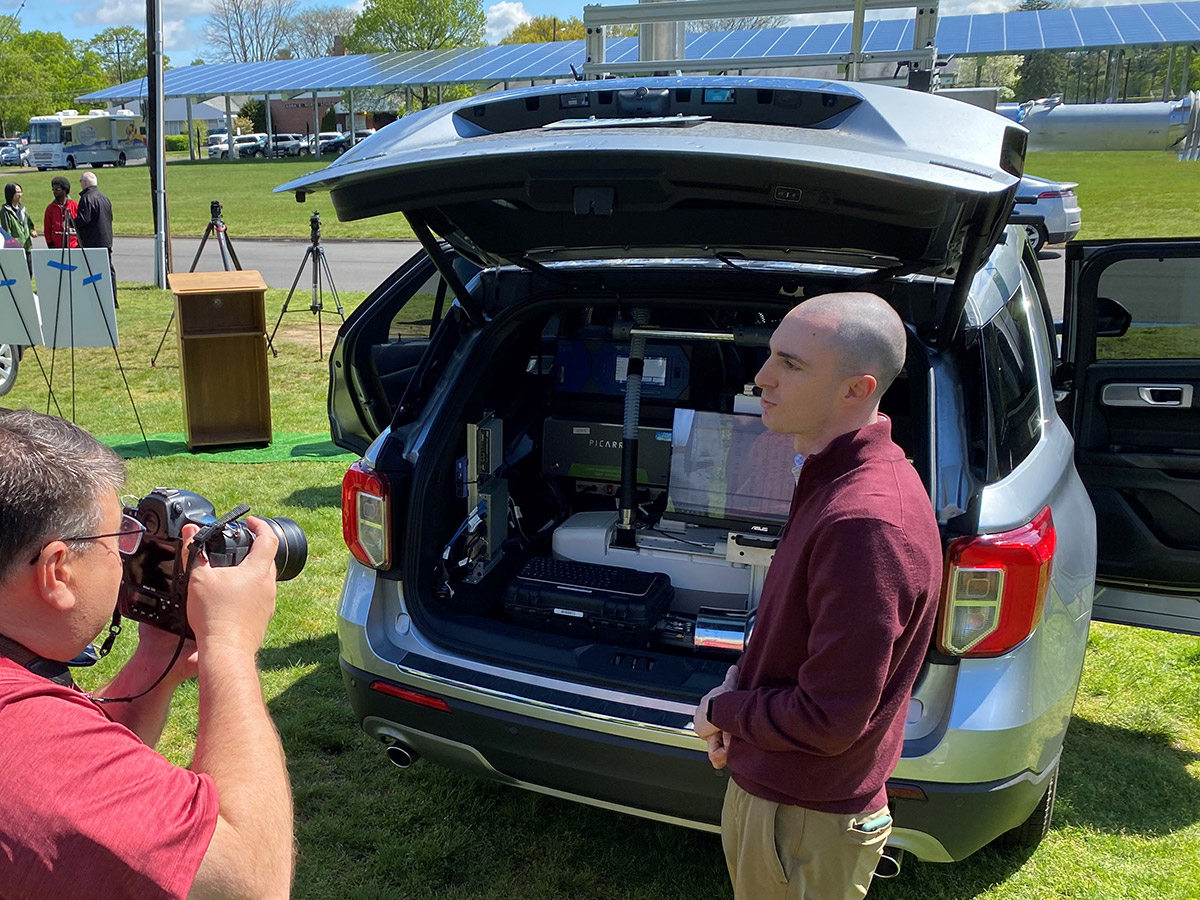Press Releases

05/01/2023
DEEP Officials Kick Off Air Quality Awareness Week by Unveiling Mobile Air Quality Monitoring Vehicle
DEEP Will Deploy Vehicle in Communities at Greatest Risk of Exposure to Air Pollution, Furthering DEEP’s Commitment to Environmental Justice
(HARTFORD, CT) –- The Connecticut Department of Energy and Environmental Protection (DEEP), joined by federal Environmental Protection Agency officials and environmental stakeholders, kicked off Air Quality Awareness Week (May 1-5) today by unveiling the agency’s new mobile air quality monitoring vehicle.
This custom-built vehicle, referred to as a Geospatial Measurement of Air Pollution (GMAP) vehicle, is equipped with air pollution analyzers, meteorological instrumentation, and high-precision GPS. The mobility of the vehicle furthers DEEP’s commitment to protecting air quality, fostering community engagement, and promoting environmental justice. While GMAP monitoring will be conducted at locations state-wide, DEEP will prioritize GMAP deployment in communities where there is the greatest risk of exposure to environmental pollution. DEEP intends to identify sources of pollution that have gone undetected using traditional source identification techniques and utilize GMAP as part of DEEP’s investigation and enforcement efforts.
“GMAP is another example of how Connecticut leads the nation in its efforts to clean up our air and protect our residents from harmful environmental pollution,” said DEEP Commissioner Katie Dykes. “We are thrilled to unveil our state-of-the-art air quality monitoring vehicle and to launch this community-focused air monitoring program. GMAP will play an important role in enhancing our responsiveness to residents’ air quality concerns and in advancing our commitment to community engagement and environmental equity.”
The GMAP vehicle can detect and record in real-time the concentration of 16 different air pollutants, including toxic vapors, particulate matter, and greenhouse gases. Additionally, the GMAP vehicle can collect ambient air samples for further analysis at a laboratory. The data gathered by the GMAP vehicle is intended to be plotted over satellite imagery using advanced mapping tools to provide a visual representation of air pollutant levels in an area.
The GMAP vehicle provides the benefits of a “Next Generation Compliance” enforcement tool and will allow DEEP to identify new or previously unknown sources of air pollution and to prioritize inspections of air pollution sources based on environmental risk.
“This cutting-edge technology will help ensure air quality is safe in communities across Connecticut – especially in communities with environmental justice concerns which have been overburdened with poor air quality,” said EPA New England Regional Administrator David W. Cash.
“People of color are more exposed to and more concerned about air pollution due to the very real health impacts on our families and communities,” said Dr. Mark Mitchell, co-chair of the Connecticut Equity and Environmental Justice Advisory Council. “As an African American environmental health physician in Hartford, I see the effects of this disproportionate exposure to pollution and air toxics on a daily basis. This mobile air pollution detection vehicle ushers in a new era of hyperlocal air pollution monitoring to enable more targeted pollution reduction and health protections.”
Background on GMAP
GMAP will help DEEP better understand air emissions and exposure to air pollution at a hyperlocal level. DEEP will use the GMAP vehicle to investigate air quality concerns and to fill the gap between its stationary air quality monitoring network and emission testing of known air pollution sources.
With the GMAP vehicle, DEEP will conduct air quality monitoring throughout the state, emphasizing monitoring in environmental justice and historically overburdened communities.
DEEP will engage community groups in these areas to better understand residents’ air quality concerns. Once there is sufficient monitoring data for a given area, DEEP will share the results with residents and will carefully describe the underlying air quality data gathered by the GMAP vehicle.
The decision about where to deploy the GMAP vehicle will be based on a number of factors, including an analysis of relevant environmental indices.
The GMAP vehicle was funded in part by a grant from the U.S. Environmental Protection Agency.
For more information, see DEEP’s GMAP webpage at the following link: Geospatial Measurement of Air Pollution - GMAP (ct.gov)



Photo Attachments: DEEP Commissioner Katie Dykes speaks at today's event with EPA New England Regional Administrator David Cash and Dr. Mark Mitchell, co-chair of the Connecticut Equity and Environmental Justice Advisory Council; Jake Felton, DEEP's Director of the Air Enforcement Division, describing the capabilities and instrumentation of the new GMAP vehicle.
- Twitter: @CTDEEPNews
- Facebook: DEEP on Facebook
Contact
DEEP Communications
DEEP.communications@ct.gov
860-424-3110

